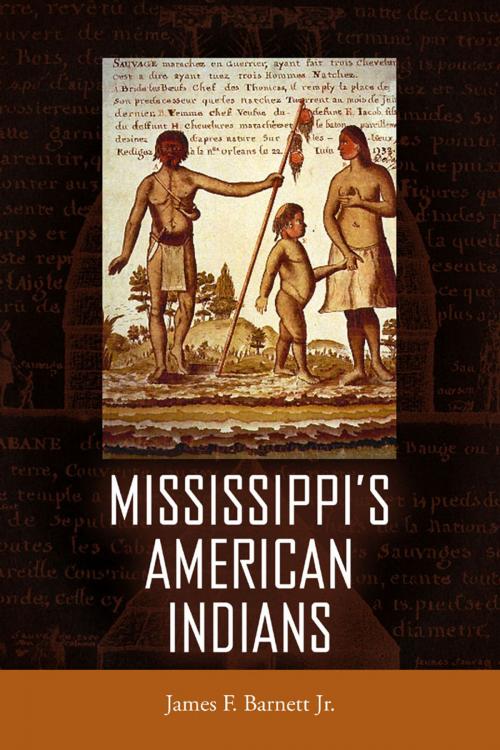Mississippi's American Indians
Nonfiction, Social & Cultural Studies, Social Science, Cultural Studies, Native American Studies, History, Americas, Native American, United States| Author: | James F. Barnett | ISBN: | 9781617032462 |
| Publisher: | University Press of Mississippi | Publication: | April 4, 2012 |
| Imprint: | University Press of Mississippi | Language: | English |
| Author: | James F. Barnett |
| ISBN: | 9781617032462 |
| Publisher: | University Press of Mississippi |
| Publication: | April 4, 2012 |
| Imprint: | University Press of Mississippi |
| Language: | English |
At the beginning of the eighteenth century, over twenty different American Indian tribal groups inhabited present-day Mississippi. Today, Mississippi is home to only one tribe, the Mississippi Band of Choctaw Indians. In Mississippi's American Indians, author James F. Barnett Jr. explores the historical forces and processes that led to this sweeping change in the diversity of the state's native peoples.
The book begins with a chapter on Mississippi's approximately 12,000-year prehistory, from early hunter-gatherer societies through the powerful mound building civilizations encountered by the first European expeditions. With the coming of the Spanish, French, and English to the New World, native societies in the Mississippi region connected with the Atlantic market economy, a source for guns, blankets, and many other trade items. Europeans offered these trade materials in exchange for Indian slaves and deerskins, currencies that radically altered the relationships between tribal groups. Smallpox and other diseases followed along the trading paths. Colonial competition between the French and English helped to spark the Natchez rebellion, the Chickasaw-French wars, the Choctaw civil war, and a half-century of client warfare between the Choctaws and Chickasaws. The Treaty of Paris in 1763 forced Mississippi's pro-French tribes to move west of the Mississippi River. The Diaspora included the Tunicas, Houmas, Pascagoulas, Biloxis, and a portion of the Choctaw confederacy. In the early nineteenth century, Mississippi's remaining Choctaws and Chickasaws faced a series of treaties with the United States government that ended in destitution and removal. Despite the intense pressures of European invasion, the Mississippi tribes survived by adapting and contributing to their rapidly evolving world.
At the beginning of the eighteenth century, over twenty different American Indian tribal groups inhabited present-day Mississippi. Today, Mississippi is home to only one tribe, the Mississippi Band of Choctaw Indians. In Mississippi's American Indians, author James F. Barnett Jr. explores the historical forces and processes that led to this sweeping change in the diversity of the state's native peoples.
The book begins with a chapter on Mississippi's approximately 12,000-year prehistory, from early hunter-gatherer societies through the powerful mound building civilizations encountered by the first European expeditions. With the coming of the Spanish, French, and English to the New World, native societies in the Mississippi region connected with the Atlantic market economy, a source for guns, blankets, and many other trade items. Europeans offered these trade materials in exchange for Indian slaves and deerskins, currencies that radically altered the relationships between tribal groups. Smallpox and other diseases followed along the trading paths. Colonial competition between the French and English helped to spark the Natchez rebellion, the Chickasaw-French wars, the Choctaw civil war, and a half-century of client warfare between the Choctaws and Chickasaws. The Treaty of Paris in 1763 forced Mississippi's pro-French tribes to move west of the Mississippi River. The Diaspora included the Tunicas, Houmas, Pascagoulas, Biloxis, and a portion of the Choctaw confederacy. In the early nineteenth century, Mississippi's remaining Choctaws and Chickasaws faced a series of treaties with the United States government that ended in destitution and removal. Despite the intense pressures of European invasion, the Mississippi tribes survived by adapting and contributing to their rapidly evolving world.















